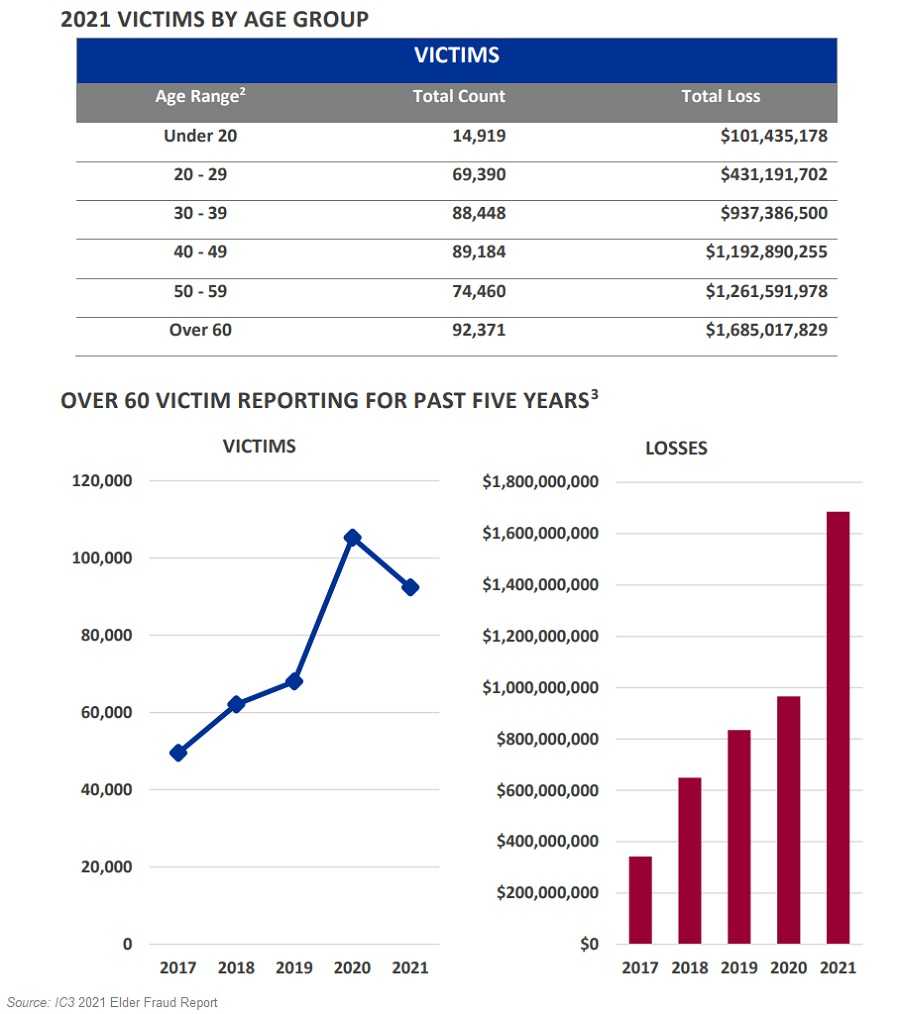It’s a sad reality that our older citizens, those most unfamiliar with online scams, can be easily victimized. The FBI’s IC3 (Internet Crime Complaint Center) 2021 Elder Fraud Report puts a spotlight on some of the most common scams used against those aged 60 and above, and some of the disturbing statistics that result. Know that scammers can victimize the same individual with a number of crimes at the same time. They can lose their money, access to an online account and for some, their identity.
The IC3 reveals statistics about reported scams targeting those 60 years and older, and here are just a few. Last year, there were 92,371 victims totaling $1.7 billion in losses, a 74% increase in losses from the prior year. The average loss per victim was $18,246, with 3,133 victims losing over $100,000 each. The report also finds the top three states where these scams are most prolific, in order of worst first, is California, followed by Florida, then Texas.

Top Scams Targeting Seniors
Tech Support: This is an old and familiar classic. Scammer posing as technical or customer support/service to extract sensitive information, or PII (personally identifiable information) from the victim, possibly ending in an account takeover. They’ll use a pop-up window on a device screen, including a phone number (leading to the scammer) for tech help. Verifying an account, the need to purchase security software, emails and texts with credential-stealing malware attachments, and fake web pages are common tools scammers use.
Confidence/Romance: Those elderly and alone, in particular, are ripe targets for these scams. A victim believes they are in a relationship (family, friendly, or romantic) and are tricked into sending money, sensitive PII, or items of value to the scammer, or help them launder money or items. This is becoming more of a nuisance with online dating and the fact that some don’t actually meet in person for long after they connect virtually.
Lottery/Sweepstakes/Inheritance: It’s human nature to love being a winner, and scammers prey on that. A victim is contacted about winning a lottery or sweepstakes they never entered, or to collect on an inheritance from an unknown relative. To claim their windfall, a victim is required to provide sensitive PII that includes personal and financial information.
Scam-Secure Tips for Seniors
 Never share personal information. Whether it’s requested by phone, email or text, handing over PII to a stranger can lead to a number of different scams.
Never share personal information. Whether it’s requested by phone, email or text, handing over PII to a stranger can lead to a number of different scams.
- Use security software and keep devices updated. Use a reputable anti-virus solution, and make sure device software and apps are updated with the latest versions.
- Protect accounts with strong passwords. Mix letters, numbers, symbols, or words and make it lengthy. If you write passwords down, keep them in a safe place away from prying eyes, and never share them.
- Always use 2FA (aka MFA) to protect online accounts. Doing so adds a layer of identity protection and can keep scammers out of personal accounts.
- Avoid website pop-ups and never open email attachments or follow links from those you don’t know or that you are not expecting.
If there is ever a time when you just don’t know, ask a friend, colleague, or even acquaintance for their thoughts. Often, they will know of the scam, have been a victim of it, or can help you decipher it before you become the next victim.